Movies & Shows
 |
 |
 |
 |
 |
 |
 |
Movie & Book Comparison - Part III
Louisa May Alcott:
A Transcendentalist Pioneer of Feminism
It was in the 1960s when I first read Little Women. Set in the Victorian era, there nonetheless seemed something very "up-to-date" in this novel about the homey Marsh family of girls that fit well with the non-conformist spirit of that decade.
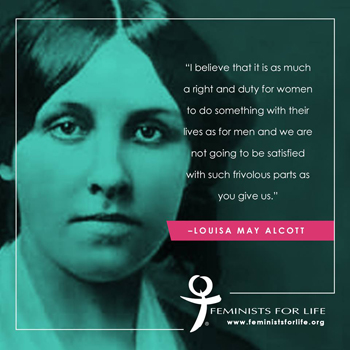 The Marsh family – and especially Jo – were so unconventional in their attitudes, flaunting conventions, taking jobs, making their own decisions and paving their way in life following the appeals of conscience, kindness and feelings rather than commandments, rules and reason. In short, Little Women is saturated with the tenets of Liberalism and Feminism, albeit well disguised in old fashioned settings.
The Marsh family – and especially Jo – were so unconventional in their attitudes, flaunting conventions, taking jobs, making their own decisions and paving their way in life following the appeals of conscience, kindness and feelings rather than commandments, rules and reason. In short, Little Women is saturated with the tenets of Liberalism and Feminism, albeit well disguised in old fashioned settings.
Although I didn't realize it then – nor did my parents or teachers – Little Women had a role to play in forming the feminist women of the future. Soft feminism seeps from the Marsh home and ambiences: A woman can be whatever she wants. She does not have to just marry. She can do so and still have a career and equal voice in family decisions.
Today, rereading the book after watching the latest version of the movie that is entrancing young women (see reviews by Miss Elizabeth (here and here), I can see how revolutionary Little Women is. I believe it helped to pave the way in the tendencies of the average American for two Revolutions that were already in the making: Feminism and the Hippie Revolt against morals and social conventions, which both took the world by storm in the 1960s.
Realizing it is impossible to understand the deep impact this book had on American girls and women without understanding the philosophy and mindset of its author, Miss Lozowski asked if I could add a third article on this topic to her Movie/Book Review series on Little Women. This book was admittedly a type of autobiography of Alcott, a quite unconventional one lived in the thick of the highly controversial Transcendentalist movement of New England in the mid 19th century.
Transcendentalist values
One tenet of American Transcendentalism reveals itself in the first scene of the most recent movie Little Women. We view the Marsh girls traipsing off in the snow on Christmas morning, the group of them passing a people-filled Protestant temple. The young ladies are cheerfully going to serve their Christmas breakfast to a poor German family.
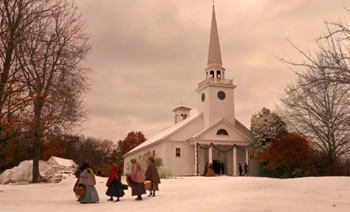 The message: The real "Christians" are not the ones gathered in the religious building, but those doing the good deeds. Religion is an unnecessary institution.
The message: The real "Christians" are not the ones gathered in the religious building, but those doing the good deeds. Religion is an unnecessary institution.
In fact, the 19th century New England brand of Transcendentalism taught that all institutions are only façades and unnecessary for the practice of virtue. These institutions – and especially religion – corrupt the purity of the individual, who should rely on self to find truth and happiness.
So, what makes a good society? The group of transcendentalists like the Alcott family – who were deeply influenced by the thinking of Henry David Thoreau, Margaret Fuller and Ralph Waldo Emerson – held that all societal structures, such as governments, political parties and churches, corrupted the human spirit, which was at its purest in nature.
The New England transcendentalists supposedly based their thinking on the method developed by Immanuel Kant. However, with the American aversion for abstraction, theorization and doctrinal thought, their Transcendental Club soon developed a much more pragmatic philosophy based on experience. The loosely knit American group united around several principles that can be condensed into three basic values: the inherent goodness of man, individualism and the divinity of nature.
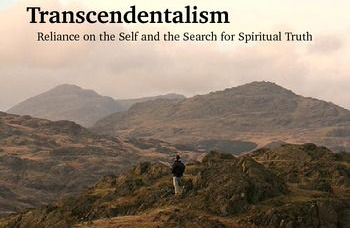 First, human beings are inherently good and pure. A man needs only to train his will, work hard and be true to his conscience rather than follow rules and Commandments in order to return to the pure state of being.
First, human beings are inherently good and pure. A man needs only to train his will, work hard and be true to his conscience rather than follow rules and Commandments in order to return to the pure state of being.
Second, transcendentalists valued individualism and self-reliance. Conformity, in their eyes, was the worst possible course of action. Being true to oneself was the highest goal. Self-discovery and reflection, then, was very important – hence the volumes of personal journals and essays produced by the transcendentalists at the time.
Third, nature was the ultimate mediator and expression of God. Most transcendentalists started as Unitarians, rejecting the Trinity in favor of one God who was present all around: in every good thing, person, flower, leaf and change of weather. The best way to experience God was by finding him in nature. No intermediary was needed for spiritual insight into God. The transcendentalists shunned the idea of a Triune God for a great “Over-Soul,” a kind of great oneness of all human spirits, the precursor to the contemporary Unitarian sect.
These transcendentalist "values" are all reflected in Little Women by Louisa May Alcott.
According to the Marsh family philosophy – which ultimately was that of Louisa herself –the ideal community could be formed by people who are completely and truly self-reliant and independent. The free and happy man thinks for himself without following the rules set forth by society or religion. Conformity, of course, is the death of individualism. Persons need only consult their own consciences to make moral decisions. And women should be allowed equal opportunities in society, career choice and family decision making.
Alcott, an early feminist
Louisa May Alcott was the second daughter of Bronson Alcott, teacher and transcendentalist philosopher, and Abby May, social worker and reformer. Patriarch Bronson was more theoretical than practical, entering enthusiastically into metaphysical speculations at the regular meetings of the Transcendentalist Club, which acted as center of his life.
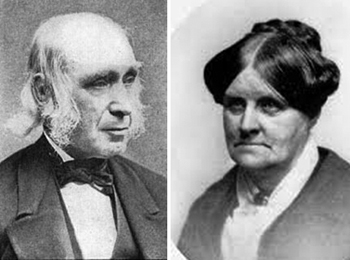 His famous Temple School (located in the Masonic Temple on Tremont Street in Boston), which employed the Socratic Method and advocated equality of sexes, failed. Soon after, he moved his family to a farmstead to establish a "back-to-the-land” utopian communal farm called the Fruitlands. After six months and a hard winter, the small group was half-starving and desperate. Another failure.
His famous Temple School (located in the Masonic Temple on Tremont Street in Boston), which employed the Socratic Method and advocated equality of sexes, failed. Soon after, he moved his family to a farmstead to establish a "back-to-the-land” utopian communal farm called the Fruitlands. After six months and a hard winter, the small group was half-starving and desperate. Another failure.
Bronson – the "most transcendental transcendentalist" as Louisa described him – was unable to make a decent living, and his wife and daughters had to work as governesses and teachers to keep the family afloat financially. Louisa, who suffered deeply from seeing the family in poverty and admittedly had no interest in following her father's philosophical musings, chose to follow the more practical social reform program advocated by her mother, an abolitionist and advocate for women's rights.
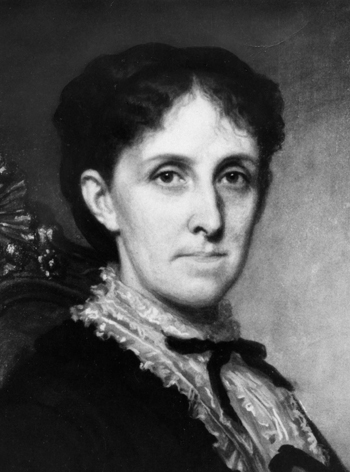 Louisa May Alcott's revolt against the traditional role of women in society was very deep. As a young woman, seen at left, we see a bitter and revolted face. Her eyes stare out making a challenge to the world: 'I can and will prove I can make it.' Her mouth, a bitter line filled with resentments. Except for the simple lace collar, there is little attempt to beautify herself; her hair is almost mannish and the ribbon tied around her neck resembles a bowtie.
Louisa May Alcott's revolt against the traditional role of women in society was very deep. As a young woman, seen at left, we see a bitter and revolted face. Her eyes stare out making a challenge to the world: 'I can and will prove I can make it.' Her mouth, a bitter line filled with resentments. Except for the simple lace collar, there is little attempt to beautify herself; her hair is almost mannish and the ribbon tied around her neck resembles a bowtie.
Louisa herself admitted in an 1883 interview with Louise Chandler Moulton her revolt against her feminine nature: “I am more than half-persuaded that I am a man’s soul, put by some freak of nature into a woman’s body.” Words that could come from the lips of the most radical 21st century feminist.
Like her mother, Louisa believed that women should be able to choose the course of their adult lives, be it marriage, a professional career, or otherwise, without the threat of being ostracized from society. "I believe that it is as much a right and duty for women to do something with their lives as for men and we are not going to be satisfied with such frivolous parts as you give us," Alcott once defiantly wrote.
In fact, in Little Women, the Marsh family serves as an example of a reformed, egalitarian family in which women exercise self-reliance, employ their non-domestic talents, and still maintain enough femininity to satisfy the readers of the day.
The ambition and rejection of conventional domesticity of Jo in Little Women made her a revolutionary character for the times. But Jo was just a soapbox for Louisa herself, who carefully used her writing to support her feminist ideas.
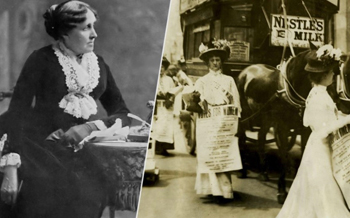 Self-reliance, hard work and independence, these were her banners. Later in life, she became an editor of a suffrage magazine and vociferously supported women suffrage, occupational opportunities, equal pay for equal work and abolition of the “woman’s sphere.”
Self-reliance, hard work and independence, these were her banners. Later in life, she became an editor of a suffrage magazine and vociferously supported women suffrage, occupational opportunities, equal pay for equal work and abolition of the “woman’s sphere.”
By the 1850s the Transcendentalism faded and seemed to die off with that small New England set of members who had tried to ignite its ideals. But those ideals they supported did not lose relevance. They lived on in the works of Emerson, Thoreau and Louisa May Alcott.
As we can see, the revolutionary ideas they championed – equal rights for men and women, non-conformism and independence, rejection of social conventions, the worship of nature and rejection of organized religion – were absorbed into American culture, and literally exploded with the Hippie Movement and rampant Feminism of the 1960s.


Today's feminists consider Louisa May Alcott as an early pioneer of their movement
Although I didn't realize it then – nor did my parents or teachers – Little Women had a role to play in forming the feminist women of the future. Soft feminism seeps from the Marsh home and ambiences: A woman can be whatever she wants. She does not have to just marry. She can do so and still have a career and equal voice in family decisions.
Today, rereading the book after watching the latest version of the movie that is entrancing young women (see reviews by Miss Elizabeth (here and here), I can see how revolutionary Little Women is. I believe it helped to pave the way in the tendencies of the average American for two Revolutions that were already in the making: Feminism and the Hippie Revolt against morals and social conventions, which both took the world by storm in the 1960s.
Realizing it is impossible to understand the deep impact this book had on American girls and women without understanding the philosophy and mindset of its author, Miss Lozowski asked if I could add a third article on this topic to her Movie/Book Review series on Little Women. This book was admittedly a type of autobiography of Alcott, a quite unconventional one lived in the thick of the highly controversial Transcendentalist movement of New England in the mid 19th century.
Transcendentalist values
One tenet of American Transcendentalism reveals itself in the first scene of the most recent movie Little Women. We view the Marsh girls traipsing off in the snow on Christmas morning, the group of them passing a people-filled Protestant temple. The young ladies are cheerfully going to serve their Christmas breakfast to a poor German family.

Doing a good deed, the Marsh girls walking past a Protestant temple on Christmas morning
In fact, the 19th century New England brand of Transcendentalism taught that all institutions are only façades and unnecessary for the practice of virtue. These institutions – and especially religion – corrupt the purity of the individual, who should rely on self to find truth and happiness.
So, what makes a good society? The group of transcendentalists like the Alcott family – who were deeply influenced by the thinking of Henry David Thoreau, Margaret Fuller and Ralph Waldo Emerson – held that all societal structures, such as governments, political parties and churches, corrupted the human spirit, which was at its purest in nature.
The New England transcendentalists supposedly based their thinking on the method developed by Immanuel Kant. However, with the American aversion for abstraction, theorization and doctrinal thought, their Transcendental Club soon developed a much more pragmatic philosophy based on experience. The loosely knit American group united around several principles that can be condensed into three basic values: the inherent goodness of man, individualism and the divinity of nature.

Trancendentalism sought god & truth in nature; below, Emerson, Thoreau & Alcott were leaders of that New England movement
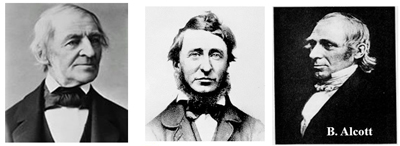
Second, transcendentalists valued individualism and self-reliance. Conformity, in their eyes, was the worst possible course of action. Being true to oneself was the highest goal. Self-discovery and reflection, then, was very important – hence the volumes of personal journals and essays produced by the transcendentalists at the time.
Third, nature was the ultimate mediator and expression of God. Most transcendentalists started as Unitarians, rejecting the Trinity in favor of one God who was present all around: in every good thing, person, flower, leaf and change of weather. The best way to experience God was by finding him in nature. No intermediary was needed for spiritual insight into God. The transcendentalists shunned the idea of a Triune God for a great “Over-Soul,” a kind of great oneness of all human spirits, the precursor to the contemporary Unitarian sect.
These transcendentalist "values" are all reflected in Little Women by Louisa May Alcott.
According to the Marsh family philosophy – which ultimately was that of Louisa herself –the ideal community could be formed by people who are completely and truly self-reliant and independent. The free and happy man thinks for himself without following the rules set forth by society or religion. Conformity, of course, is the death of individualism. Persons need only consult their own consciences to make moral decisions. And women should be allowed equal opportunities in society, career choice and family decision making.
Alcott, an early feminist
Louisa May Alcott was the second daughter of Bronson Alcott, teacher and transcendentalist philosopher, and Abby May, social worker and reformer. Patriarch Bronson was more theoretical than practical, entering enthusiastically into metaphysical speculations at the regular meetings of the Transcendentalist Club, which acted as center of his life.

The philosopher Bronson Alcott and his social-reformer wife Abby May, whom Louisa modeled herself after
Bronson – the "most transcendental transcendentalist" as Louisa described him – was unable to make a decent living, and his wife and daughters had to work as governesses and teachers to keep the family afloat financially. Louisa, who suffered deeply from seeing the family in poverty and admittedly had no interest in following her father's philosophical musings, chose to follow the more practical social reform program advocated by her mother, an abolitionist and advocate for women's rights.

Prizing her independence, Louisa May Alcott never married
Louisa herself admitted in an 1883 interview with Louise Chandler Moulton her revolt against her feminine nature: “I am more than half-persuaded that I am a man’s soul, put by some freak of nature into a woman’s body.” Words that could come from the lips of the most radical 21st century feminist.
Like her mother, Louisa believed that women should be able to choose the course of their adult lives, be it marriage, a professional career, or otherwise, without the threat of being ostracized from society. "I believe that it is as much a right and duty for women to do something with their lives as for men and we are not going to be satisfied with such frivolous parts as you give us," Alcott once defiantly wrote.
In fact, in Little Women, the Marsh family serves as an example of a reformed, egalitarian family in which women exercise self-reliance, employ their non-domestic talents, and still maintain enough femininity to satisfy the readers of the day.
The ambition and rejection of conventional domesticity of Jo in Little Women made her a revolutionary character for the times. But Jo was just a soapbox for Louisa herself, who carefully used her writing to support her feminist ideas.

Louisa, an early suffragette, was the first woman in Concord to cast a vote
By the 1850s the Transcendentalism faded and seemed to die off with that small New England set of members who had tried to ignite its ideals. But those ideals they supported did not lose relevance. They lived on in the works of Emerson, Thoreau and Louisa May Alcott.
As we can see, the revolutionary ideas they championed – equal rights for men and women, non-conformism and independence, rejection of social conventions, the worship of nature and rejection of organized religion – were absorbed into American culture, and literally exploded with the Hippie Movement and rampant Feminism of the 1960s.

Posted August 28, 2020
______________________
______________________





